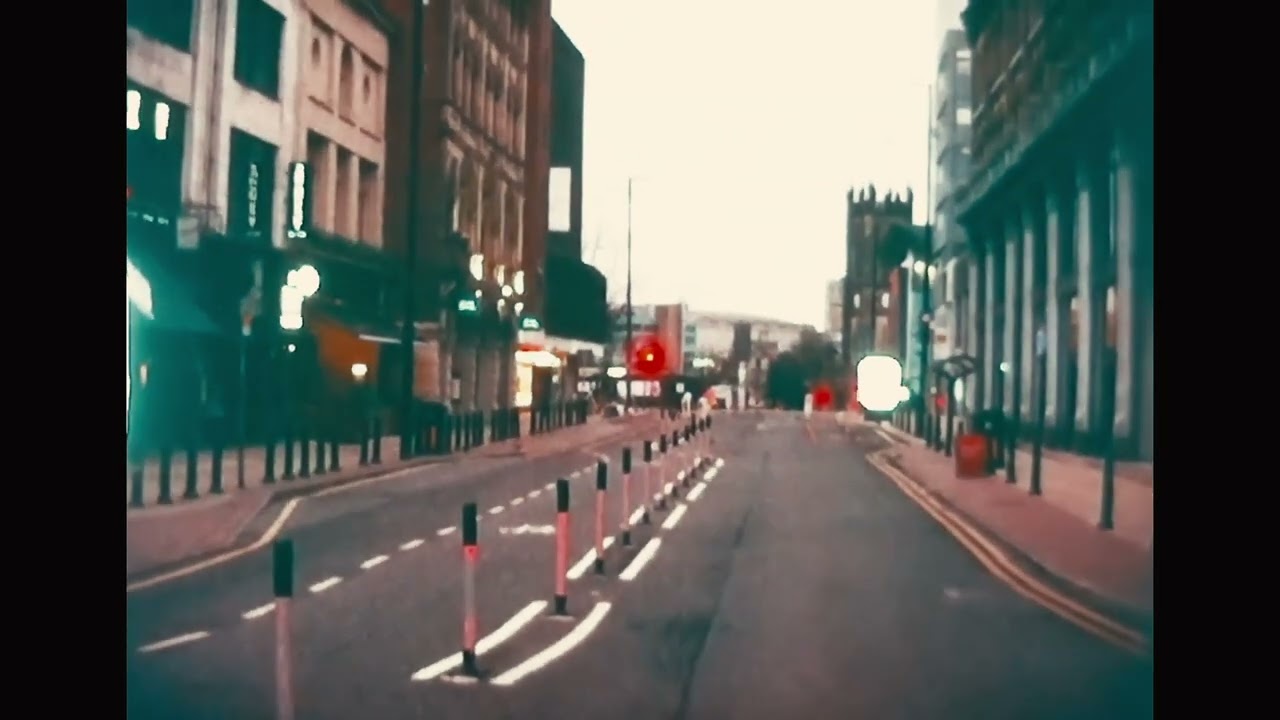For me, March is the point at which things really get going when it comes to analysing 2024 as a year in music – the advent of spring bringing that rush of energy required for that wider analysis, the stack of contenders growing higher by the week. By the strength of what’s listed below, as well as the superb releases littered through January and February, we’re off to a flyer. Should the next nine months keep up this quality, 2024 might just be a particularly fine vintage in the decades come.
All of these picks, as well as all the other excellent music we’ve covered at tQ this month, will be compiled into an hours-long playlist exclusive to our subscribers. In addition, subscribers can enjoy exclusive music from some of the world’s most forward-thinking artists, regular deep-dive essays, a monthly podcast, specially-curated ‘Organic Intelligence’ guides to under-the-radar international sub-genres, and more.
To sign up for all those benefits, and to help us keep bringing you the kind of music you’re about to read about below, you can click here. And read on for the best of the best from March 2024.
Patrick Clarke
ALBUMS
Jlin – Akoma
(Planet Mu)
Akoma continues to explore Jlin’s work as a unifier of artistic ideas, bringing in features from Kronos Quartet, Philip Glass and Björk, and introducing drumline rhythms. Though she collages many elements together, her music feels less like a patchwork and more of a fused wave that ebbs and flows with each shift. With Akoma, Jlin uses these building blocks to create different worlds on each track. There’s the dreamy sound of ‘Borealis’ at the start of the record. Later on, ‘Open Canvas’ takes a sharper approach, creating pointillistic beats that mix with gently twinkling melodies that shimmer like gossamer stars and strike like lightning. With ‘Sodalite’, Kronos Quartet’s intricate string-playing is spliced between beats, creating a sprawling patchwork quilt of trilling violins and techno. All of these tracks stem from similar inspirations and ideologic touchpoints, but no two offer the same atmosphere – some are dramatic, while others sparkle and float, and others still feel like dancefloor medleys.
Vanessa Ague – read the full review here
Perc – The Cut Off
(Perc Trax)
Fragments of arcane bits of British culture have always illuminated Perc’s work, via samples and track titles, and that’s the case on his latest album too. A weird, askance take on our culture is hinted at in ‘Milk Snatchers Return’, ‘Full Goblin’, ‘Can You Imagine?’, ‘UK Style’ and ‘Imperial Leather’, that sharp-cornered soap beloved of nans in the 1980s. In a time when electronic music culture can be tiresomely didactic or is justified by press releases that require an MA in cultural theory to untangle but actually say SFA, I like these nods and nudges. When married to this always frenetic, inventive music they create an intoxicating, lunatic atmosphere – this is a heavy but extremely enjoyable album.
Luke Turner – read the full review here
DJ Anderson do Paraíso – Queridão
(Nyege Nyege Tapes)
Often characterised by eardrum-punishing levels of distortion and rowdy vocal delivery, Brazilian funk has been gaining a wider, more global audience in recent years. Sitting at the more underground, less bass-boosted end of the sound is producer DJ Anderson do Paraíso, who hails from Belo Horizonte. Queridão, his first album, is a mind-bending trip through dissonant, macabre melodies and minimalist beats, its use of silence and space just as effective as everything that is actually present. With the help of a wide cast of guest MCs and vocalists, the producer builds a bonkers sound world that is part-haunted house, part-classical music, with its employment of choirs, strings, bells and atonal pianos through the record. Queridão, its title a reference to his local status as the "dearest", is a compelling, menacing listen unlike much else you’ll hear this year.
Christian Eede
Sleepytime Gorilla Museum – Of The Last Human Being
(Avant Night)
The first album in 17 years from Oakland-based, performance art-inclined, experimental rock troupe Sleepytime Gorilla Museum comes as a pleasant surprise. The band turn in their most varied yet integrated work to date, a fully realised sonic tapestry that unspools like a movie for the mind’s eye, demanding to be played from start to finish with each listen. The band still look like extras from Mad Max and their core sound (Art Bears-style RIO with metal, prog and industrial elements) is recognisably similar to past work, but what’s different this time around is how well all the pieces fit together, and the powerful emotional resonance these songs leave in their wake. Carla Kihlstedt’s beautiful vocals really come into their own here, contrasting perfectly with Nils Frykdahl’s metallic growl. Chamber music miniatures evoking freak show carnivals rub shoulders with industrialised folk drones (‘Silverfish’). Propulsive Sturm und Drang pieces (‘The Gift’) exist alongside dream-like prog-inflected soundscapes (‘Hush Hush’), wild post-apocalyptic almost funk (‘Save It’) and a possessed sounding cover of This Heat’s ‘S.P.Q.R.’. Perhaps best of all is ‘Old Grey Heron’, sung by bassist Dan Rathbun, its opening lyric, "After years of service and distinction, The Old Grey Heron hobbles toward extinction", evoking a stirring, emotional response not present in the band’s earlier material, for this listener at least.
Sean Kitching
Squarepusher – Dostrotime
(Warp)
Dostrotime steps into pleasantly and familiarly unfamiliar ground with ‘Wendorlan”s fractally deep digital acid breaks and high-viscosity rave hoover breakdown; and likewise with ‘Stromcor’, which is bolstered by some bloody-fingered bass shredding, which occasionally threatens to spiral off into some Mahavishnu showmanship. ‘Duneray’ is the clearest link to Be Up A Hello‘s hardware D&B breaks, complex reverb and darkside acid with oscillators screaming through multi-tap delays and is my happy place on Dostrotime. It has its mirror image in the stupendous ‘Domelash’ which has pointillistic FX continually detaching itself from/reattaching itself to the pulverising and fearsomely clocked percussive breaks and also on the insolent halftime rave-stab reverb fest of ‘Akkranen’. I don’t take mushrooms any more but if I did, I’d take them to this. ‘Kronmec’ is a suitably chilly, churchical, progressing in microtonal increments, slab of Blade Runner and A Clockwork Orange OST-indebted cold wave techno; and the churchical becomes cathedral-like (cathedrical?) on the roomy and beat-sparse ‘Heliobat’.
John Doran – read the full review here
Alison Cotton – Engelchen
(Rocket Recordings)
Translated literally as ‘little angels’, violist and singer Alison Cotton’s Engelchen tells the true story of two Sunderland-born sisters, Ida and Louise Cook, who, using international networks established through their passion for opera, secured safe passage out of Germany and Poland for a number of Jewish people in the years prior to WWII. The term ‘engelchen’ was bestowed upon them by the people they saved, and certainly their story is one of supreme bravery and compassion. Using mournful drones, haunting vocal arrangements and the judicious inclusion of foley-type sound effects, Cotton communicates not simply the details of the story but the emotional journey of its characters.
Oliver Cookson – read the full review here
Julia Holter – Something In The Room She Moves
(Domino)
Listen to this album looking out of a window, hopefully with some early blossom in view. Just over the rooftops there is one tree with flowers the pink of Himalayan salt. When I’m listening to this, I can’t look away. Something has stopped me from moving. I can only give in to the music now. My full attention is on waiting for the next treat: the embellishments, the secrets and surprises that Julia Holter offers. Something In The Room She Moves is certainly an intimate listen. It has a looseness that evokes warm undertones. But now I want to hear it on a massive sound system, laying on the floor in the middle of a modern art gallery, or an epic festival tent – somewhere I can feel the sonorous explorations.
Laura Cannell – read the full review here
Vanishing – Shelter Of The Opaque
(The state51 Conspiracy)
The simmering angst reverberating away in the noise of previous work by Vanishing – auxiliary Gnod and Lonelady musician Gareth Smith’s spoken word and ambient industrial music project – has been sublimated into a transcendent sense of space here. With each successive release Smith becomes more sure of his footing – here literally, as this music is a psychogeographical tramp across Manchester and along the length of the M62 corridor – and now everything is left bare. In fact, nakedness is only the start. Shelter Of The Opaque represents the veneer of quotidian reality being scraped away to reveal terrible mechanisms underneath, but instead of raging bluntly at what he finds, Smith occasionally overlays what he sees with a gossamer filigree to suggest how things might be instead. A rich and thoughtful experience.
John Doran
Moor Mother – The Great Bailout
(ANTI-)
Space and place are investigated in The Great Bailout cut ‘Liverpool Wins’, which plays with electronic industrial sounds to evoke the building of an Empire with blood. The album closes with ‘Quantum’, a deeper dive into Camae Ayewa’s school of thought as one-half of Black Quantum Futurism – centred around the idea linear time keeps oppressed people in narrow temporal bands where they can’t access their past or future to control their own narrative. Her previous works like Black Encyclopedia Of The Air and Jazz Codes are drenched in this fascinating extension of Afrofuturism and Black musical traditions as a vehicle for political thought – also evident in Ayewa’s free jazz collective, Irreversible Entanglements. Similarly, in The Great Bailout, Ayewa recontextualises history to show its scars on our present-day environment.
Oliver Cookson – read the full review here
TRACKS
Jo Bevan – ‘Born Ready’
Jo Bevan’s cottage industrial synth pop calls to mind The Tourists, White Town, Chris & Cosey at their most loved up and Lamb, and is, low key, one of the best singles of the year so far.
John Doran
babybaby_explores – ‘Nice Sometimes’
Hot on the heels of one of last year’s best and most brilliantly lopsided albums, ‘Nice Sometimes’ is the finest of a trio of older, hitherto unreleased tracks from what we’re told is "an unreleased top secret album entitled: I Am Not a Rock & Roll Man of the Future.
Patrick Clarke
Fat White Family – ‘Today You Become Man’
And so it transpires that two of my favourite songs of recent years have been devoted to the terror and neuroses of circumcision. The first, by Avon Terror Corps’ Concentration, dealt with the ol’snip as part of Jewish life with their track named for the act; now Fat White Family give the Muslim perspective as Lias Saoudi channels the experience of his older brother in the 1980s. I first encountered this as a spoken word, almost noise piece in some of Lias’ recent phenomenal live shows, which occupied a sweet spot somewhere between Throbbing Gristle and Leonard Cohen – it becomes a jazz-tinged panicked skronk.
Luke Turner
bog band – ‘Lovesick Blues Song’
The debut single from Irish newcomers Bog Band is a slick and easy blend of mellow left-field pop that betrays their love of The Style Council and Prefab Sprout, as well as a rare deftness when it comes to razor-sharp modern production.
Patrick Clarke
Brian Eno – ‘All I Remember’
It’s interesting that this track is part of the music for a new ‘generative’ film that, our tQ feature suggested this week, might have the power to change cinema. Perhaps this has permitted Brian Eno to embrace a sentimentality that befits his years, and if so, I for one am happy for it. I’ve always felt that among all of his many laurels, one that is a little unsung is his voice, and it’s in wonderful form in this elegiac reflection on a life busily lived. Not many people could get away with this without it being hokey and well, with the sound of children playing and lines about "flickers in windows with 40 watt bulbs", perhaps this is, just a little. Yet sentimentality that has the power to move is always a tightrope, and Eno walks it beautifully here.
Luke Turner








